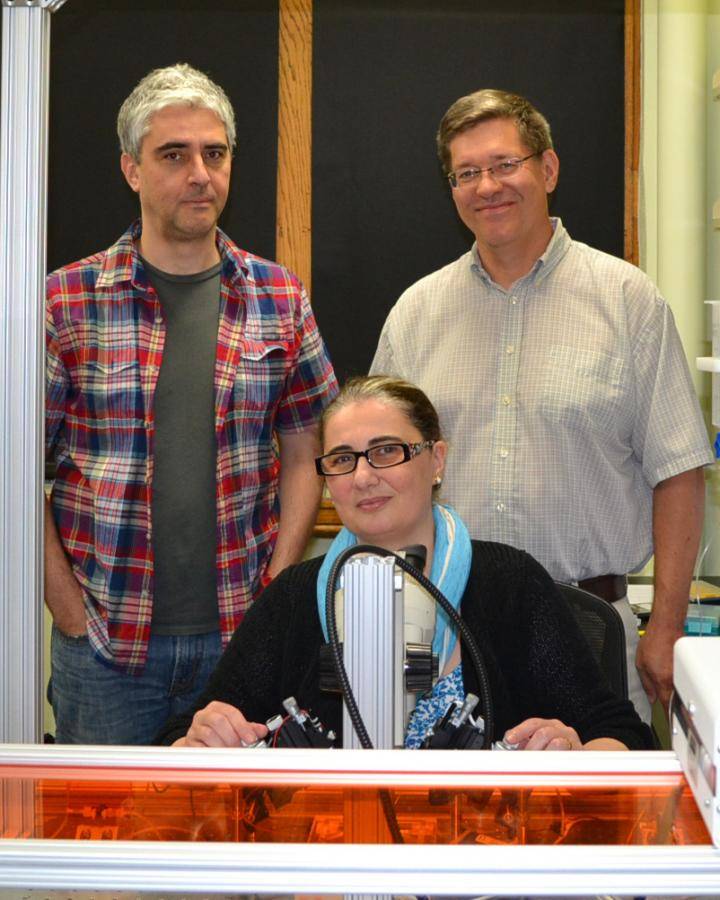
Credit: Melody Kroll, MU Division of Biological Sciences
A team of University of Missouri neuroscientists are inching closer to developing the tools needed to decipher the brain. In 2015, the team received a National Science Foundation Early Concept Grant for Exploratory Research (EAGER) award to investigate a newly discovered class of proteins that are turned on by heat. Now, the team has published a new paper that demonstrates how these proteins can be used as tools to regulate the activity of individual neurons in the brain through changes in temperature. These tools will advance fundamental brain research and potentially lead to "deep brain stimulation" treatments used for Alzheimer's and Parkinson's patients.
"Thermogenetic tools, which utilize heat to act as a 'switch' to turn neuron functions on, are expanding the horizons of brain research by allowing us to control specific neurons in the brain and measure behavioral changes," said Troy Zars, professor of biological sciences in the MU College of Arts and Science. "The goal of this fundamental research was to identify more of these special proteins, laying the foundation so that, in the future, scientists have a better understanding of how neuronal circuits function."
The research team was led by Zars, as well as Mirela Milescu and Lorin Milescu, who both are assistant professors of biological sciences at MU. The team included four undergraduate and four graduate students. Together, the researchers focused on a family of genes that encode taste receptors found in fruit flies. Surprisingly, some of these taste receptors also are activated by heat and thus play a role in detecting environmental temperature.
First, the students in Mirela Milescu's lab investigated the thermosensitivity of these proteins and identified one member of the family, called Gr28bD, as a prime candidate for thermogenetics. Then, Lorin Milescu's students used live-imaging techniques and software developed in their lab to demonstrate that the Gr28bD protein can, through temperature differences, modulate the brain activity of fruit flies.
Finally, the flies were tested in Dr. Troy Zars' lab for temperature-dependent behavior. Using a specially designed heat chamber that allows precise control of the environmental temperature, the Zars' students were able to show that the Gr28bD protein can control behavior in these flies, using temperature as a "brain switch."
"Gr28bD could become a powerful tool in controlling neuronal activity and studying how neuronal circuits function," said Benton Berigan, a graduate student in Lorin Milescu's lab. "Since this protein is not found in any mammal, it emerges as a good candidate for the development of novel thermogenetic tools to be used for basic research and potentially one day in humans."
Further study of thermogenetics could lead to the development of deep brain stimulation tools as a part of the national Brain Research through Advancing Innovative Neurotechnologies (BRAIN) project, Zars said.
This research highlights the power of translational precision medicine and the promise of the proposed Translational Precision Medicine Complex (TPMC) at the University of Missouri. The TPMC will bring together industry partners, multiple schools and colleges on campus, and the federal and state government to enable precision and personalized medicine. Scientific advancements made at MU will be effectively translated into new drugs, devices and treatments that deliver customized patient care based on an individual's genes, environment and lifestyle, ultimately improving health and well-being of people.
###
The study, "The Drosophila Gr28bD product is a non-specific cation channel that can be used as a novel thermogenetic tool," recently was published in Scientific Reports. Aditi Mishra, Autoosa Salari, Kayla C. Miguel, Marzie Amirshenava, Abbey Robinson, Jenna Lin and Benjamin C. Zars all contributed to the study. Funding was provided by the National Science Foundation (Grant: 1535790). The content is solely the responsibility of the authors and does not necessarily represent the official views of the funding agencies.
Editor's Note: For more on the story, please see: http://biology.missouri.edu/news/mu-scientists-expand-toolbox-to-study-the-brain/
Media Contact
Jeff Sossamon
[email protected]
573-882-3346
@mizzounews
http://www.missouri.edu
Original Source
https://munews.missouri.edu/news-releases/2018/0321-mu-neuroscientists-develop-potential-tools-for-the-study-brain-function-could-aid-research-in-alzheimers-and-parkinsons/ http://dx.doi.org/10.1038/s41598-017-19065-4





